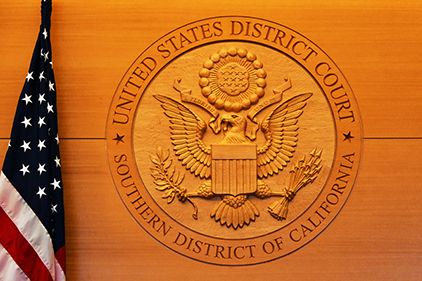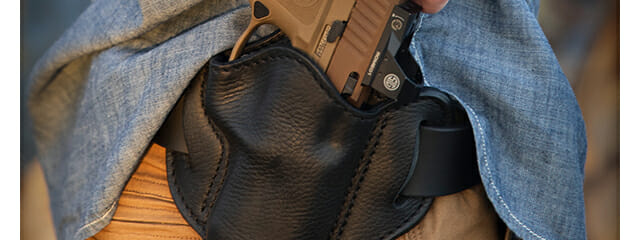California: District Court Injunction Briefly Halts Ammo Background Checks

On April 23, gun owners in California enjoyed a fleeting, but important, boost when Judge Roger Benitez of the Southern District of California issued a preliminary injunction nullifying the state’s background check requirements for ammunition purchases/transfers. The checks, established by 2016’s Proposition 63 ballot initiative, entered effect last summer and their significant chilling impact on legal sales is now clear.
The decision led to an immediate ammo-buying frenzy among informed California gun owners and was promptly overridden by a temporary stay issued by the 9th Circuit on the 24th. Thus, unlike 2019’s “Freedom Week” (which was also prompted by a Benitez-issued injunction against California’s firearm magazine restrictions), 2020’s rendition lasted less than a day. Even so, Benitez’s writing gives us plenty to discuss.
The Main Gate
Benitez describes California’s ammunition purchase regimen as a collection of doors – one “main gate” followed by four “doors”. To legally buy ammo in the state everyone must clear the main gate before proceeding to one of the subsequent options:
The main gate requires proving citizenship. Proceeding through the gateway, the California resident is then presented with a choice of four doors. Each door is a different kind of background check and each doorway leads to the back storeroom.
Yet, proving citizenship in California is not such a simple task. Benitez remarks that, “[b]y itself, a standard California driver’s license or identification card is not good enough to prove citizenship.” Expanding upon this, he highlights, “complicating the picture is a 2013 state law known as AB 60. Among other things, AB 60 directed the Department of Motor Vehicles to issue California DLs to aliens who may be unlawfully present in the United States.”
Because a standard California ID is not sufficient proof that a prospective buyer is even a U.S. Citizen, some additional proof is necessary, such as a passport or REAL ID. Neither are free and neither are as immediately available nor widely possessed as a standard ID.
Before moving past the main gate, Benitez considers that California has inverted the order of operations with respect to burden of proof:
Why does California assume that all ammunition purchasers are unlawfully present aliens until proven otherwise? Other constitutional rights are not treated this way. For example, the First Amendment protects a citizen’s right to contribute money to a political candidate while aliens are prohibited from doing the same. Yet, federal election laws do not require a political donor to prove U.S. citizenship as a precondition to making campaign contributions.
Four Doors
Californians who pass through the main gate select one of four background check options. These include a “Standard” background check, a “Basic” background check, obtaining a Certificate of Eligibility (C.O.E.), or are purchasing ammunition alongside a firearm.
The Standard background check costs $1 and is the route most frequently taken. It requires purchasers to have previously purchased a firearm in the state:
616,257 citizens chose Door No. 1 and underwent a “Standard” background check. It is an electronic Automated Firearms System (“AFS’) check cross-checked by the Armed Prohibited Persons System (“APPS”) list. With the Standard background check, there were 188 would-be purchasers identified as “prohibited persons” (felons, fugitives, violent misdemeanants, etc.) and denied authorization to purchase ammunition... Unfortunately, the Standard background check also rejected 101,047 other law-abiding citizen residents... Later analysis reveals the rejections were either because the State has no record of gun ownership or because of identifier mismatches. To put this in perspective, 16% of those who established their citizenship were rejected and prevented from lawfully exercising their Constitutional right. By comparison, .030% of those who made it through the main gate were found to be prohibited persons.
The AFS database tracks all firearm transfers in California, at least those that have taken place since its inception (1990 for handguns and 2014 for long guns). It’s possible, likely even, that many Californians own legal firearms that are not in the AFS. If a person purchased before either of the aforementioned years or moved from another state, their acquisitions would not be logged.
If the prior transfer took place in California, rectifying the situation should be fairly quick and easy. However, if a California Dealer Record of Sale (DROS) cannot be located, the process takes much longer. In some cases, as many as three months.
Those who don’t select Door No. 1 typically choose Door No. 2, the “Basic” background check. According to Benitez, “[i]f there are no hits [from criminal database searches], the Door No. 2 ammunition purchase is approved quickly. This happens approximately 25% of the time. The other 75% of the time, a manual review by a California Department of Justice analyst is required.” It isn’t clear why the delay rate is so high for this route, but the result is that few who travel this road get ammunition quickly.
Data provided by the California Department of Justice reveals significant delays:
On average, the processing time for a full Basic background check in January 2020 took one day, five hours, and sixteen minutes, which is an improvement from July 2019 when it took on average three days, one hour, and 30 minutes. In all events, a person constitutionally entitled to buy ammunition who is not quickly approved, will have to make a return trip to the same store on another day in order to acquire ammunition.
Incredibly, even those approved with a Basic check must still pay the $19 fee every time he/she purchases ammunition. There is no provision to waive the fee or reduce requirements for buyers who have already passed the Basic check. When a box of pistol ammo usually costs around $10-15, the $19 fee adds a massive markup.
Doors 3 (Certificate of Eligibility) and 4 (purchasing ammunition with a firearm) don’t receive as much attention in Benitez’s injunction. He correctly notes the Door 4 irony that encourages buyers to simultaneously stock up on firearms and ammunition.
Heller's Hardware Test
Perhaps echoing some of Justice Kavanaugh’s sentiment, Benitez argues that courts have misapplied the sliding scale of scrutiny post-Heller. In Heller, Justice Scalia established that the constitutionality of restrictions placed on firearms (and ammunition) must be assessed based on a simple hardware test. Is the firearm/ammunition commonly used for lawful purposes? If so, it is protected against infringement:
Heller asks whether the law bans the types of firearms commonly used for a lawful purpose. It is a hardware test. Heller draws a distinction between firearms commonly owned for lawful purposes and firearms specially adapted to unlawful uses and not commonly owned. As applied to laws prohibiting ammunition, the simple Heller test would ask: is the ammunition commonly used by law-abiding citizens for a lawful purpose? If yes, then it is protected ammunition.
There should be no need for additional judicial review because the regulation fails the simple hardware test. It’s likely some would observe this fact and argue that the law does not wholly prohibit ammunition sales and therefore could be subject to a lower level of scrutiny. For them, Benitez also has a response:
In this case the California state statutes not only burden the core of the Second Amendment but often impose upon the core the severest burden – a complete ban. It is true that many have been able to buy ammunition. But at least 101,047 or 16.4% of applying citizen residents have not.
With respect to intermediate scrutiny, he continues:
Perhaps with more time and more evidence than three old studies about ammunition purchase recordkeeping, the State will be able to establish a reasonable fit. At this point, however, the government has done little more than simply posited the existence of the disease sought to be cured… Here, the fit is far from narrowly tailored. The fit is that of a large square peg for a small round hole. This state experiment is a one-size-fits-all, one-of-a-kind approach with no legislative record
While California officials have argued that the plaintiffs lack standing and the case should therefore be tossed. Benitez disagrees with this assertion. According to his injunction, the government is responsible for proving that the restrictions reasonably fit the stated public safety interest, at which point he then directs back to the lack of evidence presented to support such a claim.
Finally, the Attorney General argues that the court should give deference to the public on matters such as Proposition 63 that receive majority support through ballot initiatives and referendums. Again, Benitez rejects this defense stating, “[a] ballot proposition is precisely what the Bill of Rights was intended to protect us from – a majority trampling upon important individual rights.”
Commerce Clause
The final issue raised by Benitez’s injunction addresses Proposition 63’s violation of the Commerce Clause. Because the law prohibits “importation” of ammunition purchased out-of-state, it significantly favors California vendors over vendors from other states. Citing Granholm v. Heald, Benitez states:
’[I]n all but the narrowest circumstances state laws violate the Commerce Clause if they mandate differential treatment of in-state and out-of-state economic interests that benefits the former and burdens the latter.’
Continuing with this comparison:
California’s ammunition anti-importation laws are similar to New York’s wine anti-importation law prohibiting direct sales from out-of-state wineries which was struck down for violating the Commerce Clause in Heald.
Next Steps
As noted at the start of this article, Benitez’s District Court injunction preceded a near-immediate administrative stay granted in favor of the State of California by the 9th Circuit of Appeals. The stay temporarily preserves the status quo pending further court orders. Thus, “Freedom Week 2020” came to a remarkably quick end.
It’s important for gun owners, particularly those in California to realize that just as the injunction was not the end of this issue, neither is the stay. This case has a long road ahead and it is unlikely we’ll see a resolution to/revocation of Proposition 63 any time soon. However, the challenges raised by Benitez require adequate responses from Attorney General Becerra, which will be no easy task.
An information security professional by day and gun blogger by night, Nathan started his firearms journey at 16 years old as a collector of C&R rifles. These days, you’re likely to find him shooting something a bit more modern – and usually equipped with a suppressor – but his passion for firearms with military heritage has never waned. Over the last five years, Nathan has written about a variety of firearms topics, including Second Amendment politics and gun and gear reviews. When he isn’t shooting or writing, Nathan nerds out over computers, 3D printing, and Star Wars.

